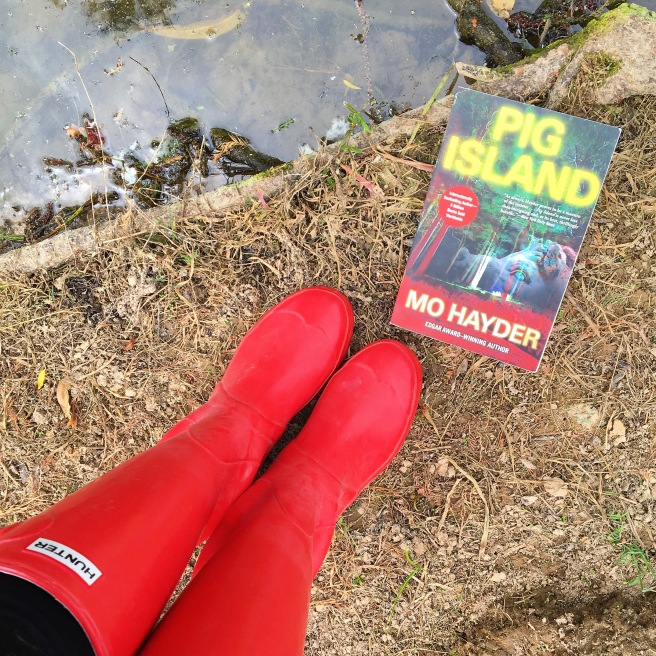
Do not be fooled by Pig Island’s unappealing title. The very banality of the name is an act of deceit, an inverse glamour that conceals a novel fixated on illusion, both in physical ugliness and false pretenses. Yet, with its allusions to both Pygmalion and The Island of Dr. Moreau, the title is also a conceit, an elaborate metaphor in which Mo Hayder marks Pig Island as an extension of these transformation narratives.
**The remaining review contains potential spoilers.**
A tourist video showing a blurry image of a grotesque half-human/half-beast on the shores of Pig Island arouses suspicions of devil worship performed by the Psychogenic Healing Ministries, the religious group that inhabits the secluded Scottish atoll. Seeking to dispel these accusations of Satanism, the PHM invites journalist Joe Oakes to investigate the “devil of Pig Island.” Oakes eagerly accepts the offer, as his reputation for debunking paranormal hoaxes originated eighteen years prior when he discredited the fraudulent faith healing ministries of the PHM’s founder, Pastor Malachi Dove. Because Dove’s increasingly erratic behavior has exiled him from the community, the PHM persuades Oakesy to disgrace the pastor a second time by writing an exposé that will have Dove declared legally insane and ousted from the island. As Oakes’s investigation reignites hostilities between the two men, he becomes a target for Dove’s delusions of godlike grandeur.
Like the purported devil of Pig Island, Hayder’s novel conveys a sense of dread and uncertainty through its amalgamated form and disquieting imagery. Dividing the action between three locations allows Hayder to mutate each strain of her story into different genres based on geography. Hayder creates a distinct atmosphere in each environment that correlates to the transformation of Dove’s daughter Angeline, whom Oakes discovers hidden on the island.
With its Lovecraftian blend of the supernatural and the scientific, the Pig Island setting evokes the tone of weird fiction. Because of a birth defect that spawned a vestigial limb, Angeline has been quarantined in the remote wilderness of the island. This is a space of trauma and madness, where Malachi has imposed both a paternal and pastoral authority over Angeline. Because he believes her deformity is unclean, a curse from the devil, Malachi subjects Angeline to repeated exorcisms in a misguided attempt to purify and purge the demons within her.
Following a tragic crime on the island, the novel shifts into a tale of domestic suspense as Joe, his wife Lexie, and Angeline relocate to a police safe house on the Scottish mainland. That this space is nicknamed the “rape suite” due to the violation of some female residents by the authorities forebodes both a physical and psychological probing into the women’s psyches. As Hayder confronts a less insidious form of masculine dominance in Joe’s attempts to protect both women from murderous threats made by Malachi, she also articulates the Oakes’ marital struggles by dividing the narrative between Oakesy and Lexie and revealing each partner’s self-motivated interest in allowing Angeline to remain the stranger in the house.
In the bleak urban wasteland of London, the novel concludes as pure noir. Haunted by fears of retribution from Malachi, Joe spirals into depression and a self-destructive madness that mirrors his antagonist’s own insanity. Meanwhile, Angeline becomes more socialized, seeking the normality denied first by her father’s obsessive control and then by Joe’s desire to shield her from a society that could potentially be repulsed by her disfigurement. As Angeline struggles to assert her own identity, the conflict between Joe’s regression and her maturation culminates in disastrous consequences.
Continuing the tradition of transformation narratives, Hayder illustrates how metamorphosis leads to revelation. In this instance, though, Hayder overthrows the patriarchal authority implicit in the god-creator figures of Shaw and Wells. Through its porcine connotations of chauvinism, which often enforces the possession of female figures through isolation, Pig Island exposes a sexism that is much more sinister in its delusions than any demon, devil, or demigod.
Pig Island; 352 pages; Grove Press, 2015 reissue.

I have read Mo Hayder’s other book wolf and I loved it so much 🙂 I should check out Pig Island
LikeLike
Yes, definitely! I now need to read everything else she has written.
LikeLiked by 1 person
She is amazing at Crime fiction 🙂
LikeLiked by 1 person